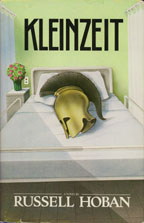Kleinzeit, middle-aged ex-advertising copywriter, is admitted to the hospital with pain in his hypotenuse, which spreads quickly to his diapason, asymptotes, and stretto. That baffling sentence tells you a lot about the world of Kleinzeit, which is not quite our own. For one thing, everything talks--anthropomorphism is the principle stylistic tool Hoban employs in Kleinzeit. See for yourself:
Under the bed Death sat humming to itself while it cleaned its fingernails. I never do get them really clean, it said. It's a filthy job I've got but what's the use of complaining. All the same I think I'd rather have been Youth or Spring or any number of things rather than what I am. Not Youth, maybe. That's a little wet and you'd hardly get to know people before they've moved on. Spring's pretty much the same and it's a lady's job besides. Action would be nice to be, I should think.
Elsewhere Action lay in his cell smoking and looking up at the ceiling. What a career ,he said. I've spent more time in the nick than anywhere else. Why couldn't I have been Death or something like that. Steady work, security.
When Kleinzeit is admitted to the hospital, he doesn't merely enter a building; he contacts a rapacious, sadistic anthropomorphic being who wants to devour him:
You understand things, said Hospital. You're clever.
Ever so, said Kleinzeit, looking for a mousehole small enough for him.
Yes, said Hospital, and became one infinite black mouth. Didn't even bother with teeth. Just an infinite black mouth, fetid breath. Kleinzeit backed into a mousehole. If the hole is this big the mice must look like oxen here, he thought.
Everything is personified: Death, Action, Hospital, Memory, Underground, the bathroom mirror, the sheets of yellow paper that beckon for Kleinzeit to write on them (and may have some sinister connection to why Kleinzeit is in the hospital in the first place). That sounds like it might get annoying, but it works because Kleinzeit is a story about a man facing the powers which are outside of his control, and threaten to destroy him. Giving a voice to "Hospital" allows Hoban to revitalize the conflict between a person and his own bodily health. Who, being in poor health, has not found the hospital itself to be ominous, even malicious?
While in Hospital, Kleinzeit and his attending nurse, called Sister, fall in love. I'm not sure I can describe the rest of the plot without sounding a little ridiculous: Kleinzeit and Sister go busking in the London underground; Sister finds an ancient Greek helmet; Kleinzeit struggles to figure out the connection between the yellow paper to his illness and those of the others in his ward; Hospital tells Kleinzeit the true story of Oprheus and Eurydice; other minor characters with names like Flashpoint and Schwarzgang and Dr. Pink come and go.
Kleinzeit is so scatterbrained and strange it seems as if it ought to fall apart like Nathanael West's The Dream Life of Balso Snell or Mervyn Peake's Titus Alone, two books which are nearly unreadable. But somehow, Hoban manages to unite all these disparate parts into a touching meditation on man's relationship with Death--a creature that turns out, in the end, to be not nearly as hostile as Hospital.
This is the third novel I've read by Hoban, after Riddley Walker, which I loved, and Pilgermann, which I did not. Each one is weird in its own way, and accomplished in its own way, but none of the three is like the other--so much so that it's hard to believe that they were written by the same person. If nothing else, Hoban has a range that few other authors can rival, perhaps none.


5 comments:
This sounds like I'd love it.
WTF, is this book out of print...?
That doesn't surprise me. I got my copy at Reader's Corner in Raleigh.
http://www.abebooks.com/servlet/SearchResults?sts=t&tn=kleinzeit
Hope I like it because I just ordered a first edition.
Post a Comment